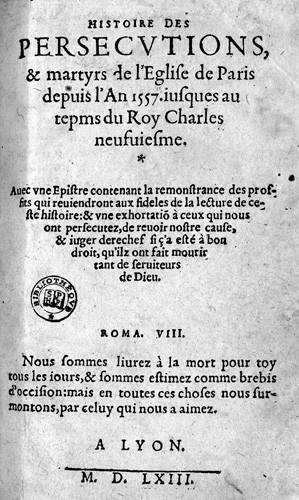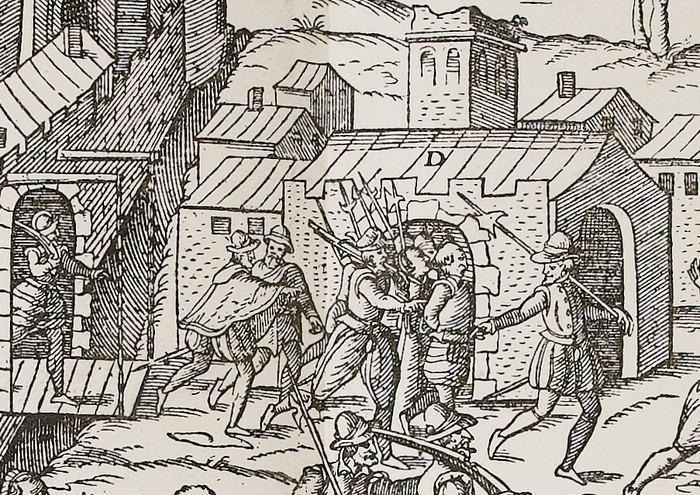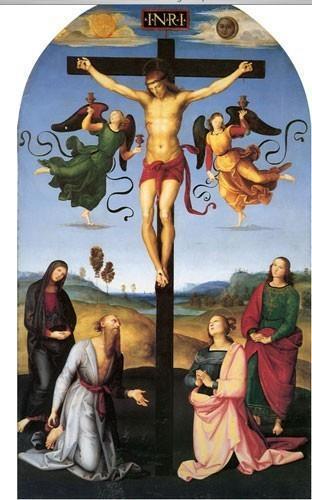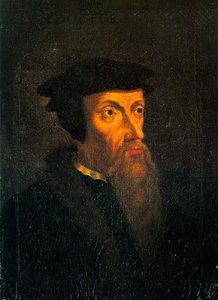The incident of rue de Faubourg Saint-Jacques
On the 4th September 1557, 400 people were caught by the authorities taking part in a Protestant meeting in a private house on the rue Saint-Jaques, in front of the college of Plessis. Some managed to escape but about a hundred people were arrested, among them many ladies of the nobility, who were sent to the Châtelet prison.
A chronicler wrote that the ladies were roughly treated ; “they were struck with heavy blows, their hair was torn out and they were led to the Châtelet prison. They were accused of having taken part in “an orgy of eating and drinking”.
The royal prosecutor came to the Châtelet prison to see what had happened : “We spent a long time reading the Holy Scriptures in the vernacular,… the minister prayed to God, explained about the institution of the Last Supper… he gave them the bread and the wine… We prayed for the king and for the prosperity of his kingdom. As soon as the Last Supper was mentioned, it was as if some terrible act had been committed. The authorities would not listen to anything the prisoners tried to say in their defence – they were immediately condemned to death and led away to prison.” (Histoires des persécutions et martyrs de l’Eglise de Paris, Lyon,1563)
Calvin wrote the following words to the Church in Paris after these arrests : “My dear sirs and brothers, it is not necessary to declare how very deeply we have been affected by your terrible affliction… whatever may happen, never doubt that our God is watching over you… one thing is certain, that if He has allowed this to come about, it was in preparation for something great which is to come…“ (II, p.141) “I promise you that the good, faithful Shepherd who cares for us will never abandon His sheep, whatever the enormity and fury of their enemies’ cruelty.” (II, p.142)
Letter to prisoners in Paris
Calvin wrote these words to the ladies shut up in the Châtelet prison, who were badly treated, “struck with blows” according to Théodore de Bèze, some of whom were even tortured.
He expressed his compassion for these “very dear sisters” and encouraged them to accept their fate : “If men are indeed weak and easily troubled, women are even more so, – simply a fact of nature. But God, who has need of fragile vessels, knows very well how to make His virtue shine from His own weak creatures. This is why you must take refuge in Him, you must continually beseech Him and pray that the incorruptible seed, which He has placed in you (thus enabling Him to adopt you as His children), may bear fruit in times of need and strengthen you to fight against any distress or affliction…“ (II, p.142)
Why Calvin's thinking is so modern
Calvin’s letters to the women prisoners reveal the fact that the Reformation had brought a new attitude : now there was no longer any distinction to be made between men and women, clerics and lay people.
Perhaps this may have been partly due to the revolutionary Reformation concept of universal priesthood.
Indeed, Calvinism gave women a new sense of independence and personal fulfilment ; it is probably not by chance that noblewomen particularly, aligned themselves with the Reformation.
In the following extract, the equality of men and women because they are God’s creatures is discussed : “since it pleased God to call to Himself both men and women (for in His eyes they are of equal worth)… He has filled every creature with His Spirit and makes boys and girls alike utter words of prophecy.“
He strongly asserts the equality of all as regards salvation : both men and women, great and small, rich and poor…
His words remind us of Paul’s Epistle to the Galatians (3, 28) : “There is no such thing as Jew or Greek, slave or freeman, male or female ; for you are all one in Christ Jesus”.
Then he mentions the case of the brave women languishing in the Châtelet prison, who are the very essence of “virtue and steadfastness” : He gives them an example to encourage them : the steadfastness of the women at the foot of Christ’s cross… “when the apostles had abandoned Him, they alone persevered, with wonderful steadfastness.“(p.148)






